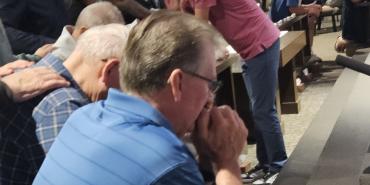Q&A: Financial Accountability in the Local Church

In each issue, a forum of pastors, laity, theologians, and church leaders respond to your questions on subjects such as doctrine, theology, Christian living, and the church. Send your questions to Holiness Today, Church of the Nazarene Global Ministry Center, 17001 Prairie Star Parkway, Lenexa, KS 66220. E-mail: holinesstoday@nazarene.org. The editor regrets that all questions cannot be printed, acknowledged, or answered.
Q. At our church, the head usher usually counts the offerings and makes deposits by himself. That seems unwise. Does the Church of the Nazarene have an official position on how offerings should be handled, counted, and deposited? And how would you suggest approaching the above situation?
It is important to ensure that your church has implemented policies and procedures for handling cash and check donations, weekly offerings, check writing and other disbursements of funds. Compliance and monitoring of such internal controls will safeguard church assets and contributions from misappropriation or diversion. Efficiency of operations and reporting accuracy are strengthened by good internal controls and ensuring proper recordkeeping.
While not all inclusive, basic internal controls should address separation of duties, dual control, limited access, and approval of individuals assigned to financial duties.
1. An individual should not be assigned more than one of the following tasks: Counting offering, recording contributions, writing checks, or reconciling the bank statements.
2. Assign at least two people to the custody of the offering, counting the offering, and preparing the bank deposit for safekeeping in a limited access area until it can be banked.
3. Verification of offerings and deposits must be signed by each person participating in counting and deposit preparation.
4. All cash and check deposits should be transferred to the church's vault, bank night depository, or banking office the next business day.
5. All deposits should be compared, by date and amount, to bank statement entries on a monthly basis, or weekly if statement is available on-line.
6. Authorization of individual access to offerings and donations of checks and cash should be limited to persons approved by the finance committee of the church.
7. Authorization for access to bank accounts and check writing should be limited to persons approved by the church finance committee. Designated signatures of such individuals must be documented in bank records. A good practice is to require two signatures on checks written from church accounts.
The implementation of financial controls is not reflective of lack of trust in individuals, but rather a prudent way to protect those who work with church finances as well as the church, should accountability be questioned.
Caring for the generous stewardship gifts of God's faithful people is a privilege that comes with a great responsibility. Ensuring and honoring the expectation of financial accountability to the donor is possible through the due diligence of internal controls. Most importantly it is a testimony to our church and our mission.
Additional helps are available on-line at the Evangelical Council for Financial Accountability (ECFA) web site: www.ecfa.org/HomePage.aspx. The Church of the Nazarene is a member of ECFA.
Marilyn J. McCool is general treasurer for the Church of the Nazarene.
Holiness Today, January/February 2010
Please note: This article was originally published in 2010. All facts, figures, and titles were accurate to the best of our knowledge at that time but may have since changed.




